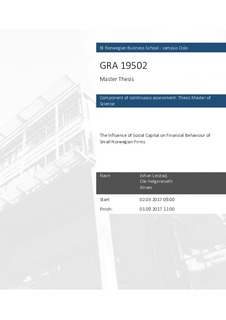The influence of social capital on financial behaviour of small Norwegian firms
Master thesis
Permanent lenke
http://hdl.handle.net/11250/2483572Utgivelsesdato
2017Metadata
Vis full innførselSamlinger
- Master of Science [1621]
Sammendrag
Social capital has been shown to influence investments and cash flow sensitivity
in other countries. Still, there are limited amount of research on this topic using
Norwegian firms. Due to high level of trust in Norway, the thesis’ implications
might differ from other foreign studies. In this master thesis, we show that
municipalities with higher levels of trust had significant effect on investment and
cash flow sensitivity to investments (CFSI) on Norwegian non-listed firms located
in that region. The accounting information is of high quality from a unique
database which has accounting data for all Norwegian private firms. We argue
that higher levels of trust increase the firms’ investments and increase CFSI. We
also provide evidence that where trust and sociability is higher, the effect on
investment and CFSI is stronger. Additionally, we suggest that civic engagement
increase the effect of trust on investments, while it has little economic robustness
on the effect of trust on CFSI.
In this master thesis, we research how social capital influence Norwegian nonlisted
firm’s investments and cash flow sensitivity to investments (hereafter
denoted by CFSI). First, we test the economic significance of the tax reform in
2006 on our models. Thereafter we test our main hypotheses, as outlined in the
first sentence above. Finally, we analysed how sociability and civic engagement
influence the marginal effect of trust on capital expenditures and cash flow
sensitivity to investments.
Firstly, trust had no statistically stronger marginal effect after 2005 for neither
investments nor CFSI. Because there are no structural difference or implications
before and after the tax reform in our models, we continued using a model without
inclusion of interaction terms with the tax reform.
Secondly, trust had a significant effect on investments, independent of the tax
reform. It has a positive influence on investments - in line with previous literature.
Trust was statistically significant in the CFSI-model, consequently having a
positive impact on CFSI. The result is rather surprising; however, some literature
support our findings. Finally, our last analysis assesses the marginal effects of trust on investments and
CFSI with different levels of sociability and civic engagement. In areas with
higher levels of sociability, the marginal effect of crime rate on investments and
CFSI decreases and the marginal effect becomes stronger. However, the effect of
sociability is only significant up to roughly the 90th- 95th percentile and 95th
percentile for sociability for investments and CFSI, respectively. Accordingly, in
areas with very high sociability, sociability is expected to have no effect on the
marginal effect of crime. Civic engagement showed to have a significant effect on
the marginal effect of crime on investments for any value during our whole
sample period (according to a 90% confidence interval), and it decreased the
marginal effect (marginal effect became more negative – hence stronger) of crime
on investments - which was negative. Additionally, civic engagement proved in
this thesis to slightly increase the marginal effect of crime on CFSI. Civic
engagement had no significant effect when levels were very high. However, its
economic significance is limited.
The results for the investment-models are pleasing and in line with expectations
and previous research papers, while the CFSI-models gave us results that were
different from our expectations, but somewhat in line with previous research.
Beskrivelse
Masteroppgave(MSc) in Master of Science in Business, Business law, tax and accounting - Handelshøyskolen BI, 2017
